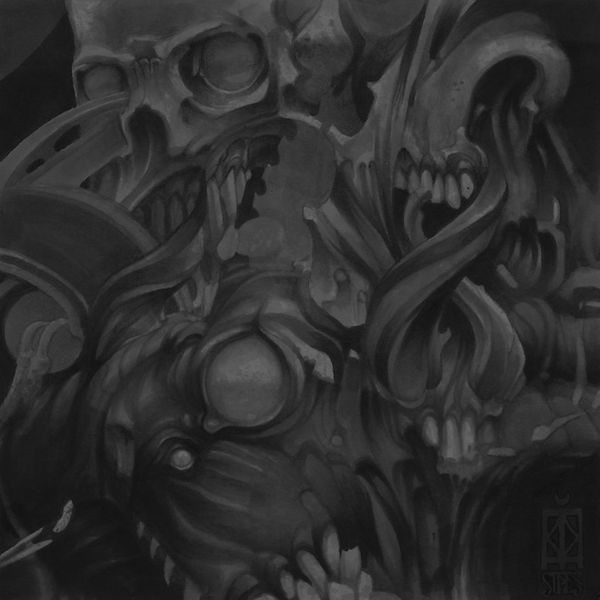Disjecta Membra: The Infancy Gospels Premiere

It’s an honour to be premiering an exclusive mix of the title track from Disjecta Membra’s brand new EP, The Infancy Gospels, here on Six Noises. (I’ll even pause right here… so you can scroll down and press play on the gloriously tangled wreckage of “The Infancy Gospels”.)
You back? Good.
As I said, it’s a genuine privilege to be hosting new music from New Zealand’s pre-eminent gothic rock band. At least, that’s what Disjecta Membra are most famed for being. But there’s every chance that The Infancy Gospels might well dispel any fixed genre tags.
The Infancy Gospels reveals a band in motion, with Disjecta Membra expanding their sound and taking risks on their most diverse recording yet. That said, long-time fans, there’s really no need to panic. Disjecta Membra might be broadening their range, but pre-eminent and gothic are descriptors that still hold true.
Disjecta Membra formed in 1993 and were the first New Zealand gothic rock band to receive recognition overseas. (The band’s founder, Michel Rowland, remains at the helm today.) Disjecta Membra’s debut album, 1997’s Achromaticia, is widely acknowledged as a cult classic in gothic rock and darkwave circles. And while Disjecta Membra has had varied lineups and periods of inactivity, the band’s return in recent years has been accompanied by a creative resurgence, or an artistic reawakening – take your pick.
The band released their “gothabilly and cybergoth” Death by Discothèque EP, and Disjecta Membra’s 2016 single, “Whakataurangi Ake”, featured musician Rob Thorne playing traditional Māori instruments on the haunting track. Those releases showed Disjecta Membra evolving beyond their trad goth roots. And today, folk, post-punk, synthpop, noise, new wave, no wave, drone, blues, swamp and garage rock, and traditional Māori influences all play a role in Disjecta Membra’s sound.
 That diversity is made manifest on the band’s new EP, which, Rowland notes, was “devised to showcase something of our stylistic range, which I think (hope) is a lot more interesting than a goth-by-numbers formula”. The Infancy Gospels certainly doesn’t see Disjecta Membra delivering anything by numbers. The EP finds a good balance between remaining true to the band’s dark and dramatic aesthetic while incorporating a wider spectrum of influences.
That diversity is made manifest on the band’s new EP, which, Rowland notes, was “devised to showcase something of our stylistic range, which I think (hope) is a lot more interesting than a goth-by-numbers formula”. The Infancy Gospels certainly doesn’t see Disjecta Membra delivering anything by numbers. The EP finds a good balance between remaining true to the band’s dark and dramatic aesthetic while incorporating a wider spectrum of influences.
The Infancy Gospels also marks the parting of ways for two members of the band: keyboardist and guitarist Matthew Tāmati Scott, and bassist and vocal contributor Isobel Te Aho-White. Rowland has noted that The Infancy Gospels is, in part, a tribute to that line-up. But the EP seems also to be drawing a line in the sand, marking a new stepping-off point.
The Infancy Gospels opens with the aforementioned “Whakataurangi Ake”. Moving synth and Māori instrumentation weave an evocative atmosphere on the track, while soul-stirring vocals pierce the veil while gripping the heart. There’s an ethereality to the song that reflects the influences that Rowland’s noted, such as Dead Can Dance or “New Zealand nose/ambient/drone artists like Peter Wright, Alastair Galbraith, Alex Mein Smith and Andy Humme”. That’s all there, but with “Whakataurangi Ake” being originally composed by Maniapoto tribal elder Pumi Taituha, and being informed by the long history of waiata (traditional Māori song), the song also has a deep connection to the next realm; something that’s palpably felt.
Up next on The Infancy Gospels is the EP’s storming title track. A feedback-fuelled beginning is followed by guitarist Kane Davey ripping into a filthy swamp rock riff. And then Rowland’s gruff growl seals the song’s… well, fucking rock ’n’ roll swagger, to be honest.
Of course, that’s a swagger that remains off-kilter, with Rowland and co setting out to destroy (with “layer upon layer of noisy guitars [as a] violent response”), the heavy blues core of “The Infancy Gospels”. Smashing and crashing guitars is the perfect approach too. Davey’s frenzied leads careen through no wave static, gouging an ugly groove like The Birthday Party channelling The Jesus and Mary Chain. Add a heavy helping of influences from “Antipodean swamp rock like The Wreckery, The Saints, S.P.U.D., Canis and Hog Haul Valentine”. And that’s the down and dirty brilliance of the EP’s fiercest track.
 Follow-up track “Lilitu” traverses an entirely different route. It’s skittery and scratchy, with a graveyard chill. Much like the earliest and prickliest work of Australian post-punks Masses, “Lilitu” harks back to post-punk’s first late-night (and darkly gothic) thrills. The song’s snarky riffs and propulsive bass see Disjecta Membra reshape the influence of bands like Siouxsie and the Banshees and Bauhaus into novel form. Is it old made new? Or is it new made old? It really doesn’t matter. “Lilitu” is just a hell of a lot of spiky and spooky fun.
Follow-up track “Lilitu” traverses an entirely different route. It’s skittery and scratchy, with a graveyard chill. Much like the earliest and prickliest work of Australian post-punks Masses, “Lilitu” harks back to post-punk’s first late-night (and darkly gothic) thrills. The song’s snarky riffs and propulsive bass see Disjecta Membra reshape the influence of bands like Siouxsie and the Banshees and Bauhaus into novel form. Is it old made new? Or is it new made old? It really doesn’t matter. “Lilitu” is just a hell of a lot of spiky and spooky fun.
Disjecta Membra make another sharp turn on the EP, delivering an evocative folk shanty, “Cernunnos”, next. With lyrics influenced by “W. B. Yeats and Robert Graves first and foremost…”, “Cernunnos” sees Rowland don his storyteller hat. Rowland intertwines spoken and sung vocals, while the rest of the band sound like Steve Von Till and Current 93 covering a lost Leonard Cohen track (with a dose of Nick Cave and the Bad Seeds’ devotional fervour thrown in). Acoustic and electric guitars coil around each other on the track, and while forbidding folk frames “Cernunnos”, there’s an undercurrent, says Rowland, that links the track to a band like The Doors at their darkest and most reverential.
“Madeleine! Madeleine!” finishes The Infancy Gospels. The upbeat anthem tips its hat to Depeche Mode, New Order and Gary Numan with its mix of bass-heavy synthpop and darkwave. Rowland says “Madeleine! Madeleine!” was one of those “catchy little ditties that write themselves and go down with audiences about a hundred times better than the ones you actually laboured to bring to bear”. Personally, I much prefer the EP’s darker and coarser tracks. But there’s no question that “Madeleine! Madeleine!” has a big ol’ shiny hook, and if you’re a fan of post-electropop, it might well snag you.
And that’s The Infancy Gospels. Five songs that highlight Disjecta Membra’s continuing creative evolution. Skillfully recorded by Bryan Tabuteau (Crash-Scan, Nullity, and Узб96), The Infancy Gospels sounds aptly cold and crisp, with its edges burred or sharpened where necessary, and with Rowland’s vocals given the chasmic depth they deserve.
Twenty-three years and innumerable hurdles later, Disjecta Membra are seeking out fresh artistic challenges, while still creating haunting, original music. How many other long-running bands could say the same? As dark and dramatic as always, Disjecta Membra continue to impress and inspire.
The Infancy Gospels is available for pre-order from Disjecta Membra’s Bandcamp page right now.



